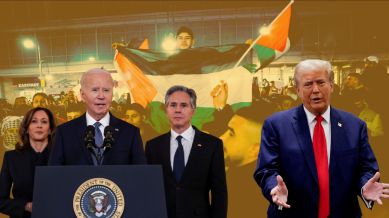Stay updated with the latest - Click here to follow us on Instagram
Israel-Hamas ceasefire: It was Joe Biden’s deal but Donald Trump’s threat may have spurred negotiations
Israel-Hamas Ceasefire Deal: What went behind the ceasefire agreement between Israel and Hamas? Read on.

Israel-Hamas Ceasefire Deal Update: The end of the 15-month conflict in Gaza is in sight, with Hamas and Israeli negotiators reaching a ceasefire agreement on Wednesday. The phased deal, expected to take effect on Sunday, January 19, will see the Hamas swapping hostages with imprisoned Palestinians in Israel. The deal was formally announced by United States President Joe Biden, who has been instrumental in negotiations between the warring groups over the past year.
For Biden, the deal marks a capstone in his foreign policy legacy, one final act of redemption before he demits office. He will go down in history as the President who put an end to the bloodiest war in the history of the Israel-Gaza conflict. He, however, shares the credit with his successor, Donald Trump.
monthly limit of free stories.
with an Express account.
“I would also note this deal was developed and negotiated under my administration but its terms will be implemented for the most part by the next administration. In these past few days we have been speaking as one team,” Biden said, officially announcing the ceasefire agreement.
Later, in his farewell address, Biden added, “I told my team to keep the incoming administration fully informed. Because that’s how it should be: Working together as Americans.”
Trump, too, did not shy away from taking credit. “This EPIC ceasefire agreement could have only happened as a result of our Historic Victory in November, as it signaled to the entire World that my Administration would seek Peace and negotiate deals to ensure the safety of all Americans, and our Allies,” the President-elect posted on social media platform Truth Social.
“We have achieved so much without even being in the White House. Just imagine all of the wonderful things that will happen when I return to the White House…” he said.
Trump added that his administration, including his Special Envoy to the Middle East, Steve Witkoff, will continue to work closely with Israel.
Trump’s threat to Hamas
Trump is not entirely wrong. War analysts have noted that Trump’s assertions that he did want to see the war continue in the Middle East may have spurred both parties to reach a solution.
On January 7, Trump issued a warning: If the hostages are not returned by the time he assumes office on January 20, “all hell will break out in the Middle East”. Witkoff added weight to Trump’s words by telling reporters, “I actually believe that we are working in tandem in a really good way. But it’s the President (Trump), his reputation and the things that he has said that are driving this negotiation.”
Citing official sources, news agency Reuters reported that it was a “fruitful participation” of both Witfkoff and Biden’s Middle East envoy, Brett McGurk, in the last crucial 96 hours of negotiation that led to the finalising of the ceasefire deal.
Pressure on Benjamin Netanyahu
Trump may have also helped move the needle on Israel’s end.
Critics of Israeli Prime Minister Benjamin Netanyahu have often argued that he has foiled past agreements with Hamas for his interests. A war with the Palestinians would help Netanyahu appease his far-right allies. Just days before the ceasefire deal was reached, Israel’s Minister of National Security Itamar Ben-Gvir had admitted in a post on X, “Over the past year, through our political power, we have managed to prevent this deal from coming to fruition, time after time.” Ben-Gvir argued that the deal would strip Israel of its military achievements in Gaza.
The PM and his supporters, however, have accused Hamas of the delay, stating that the militant group was not taking negotiations seriously. A person familiar with the negotiations told Reuters that Witkoff “was able to pressure Netanyahu into accepting the deal and moving quickly”.
The fact that Netanyahu first dialled up Trump and then Biden, after the agreement was brokered, indicates Trump’s significant hand in the deal.
In a statement on X, the Prime Minister’s Office said that Netanyahu thanked Trump for “his assistance in advancing the release of the hostages and for helping Israel bring an end to the suffering of dozens of hostages and their families”.
“Prime Minister Netanyahu then spoke with US President Joe Biden and thanked him as well for his assistance,” the statement added.
Tom Malinowski, a former Democratic Congressman and diplomat, summed it up best: “This was Biden’s deal, but as much as I hate to say it, he couldn’t have done it without Trump — not so much Trump’s performative threats to Hamas, but his willingness to tell Bibi (a nickname for Netanyahu) bluntly that the war had to end by Jan. 20.”
What next
Phase one of the agreement will allow the return of hostages and Palestinian prisoners. It will also see a gradual rollback of Israeli troops from Gaza and the return of displaced Palestinians to their homes.
Before that, the Israeli Cabinet must vote to formally ratify the ceasefire agreement. The decision was set to be made on Thursday.